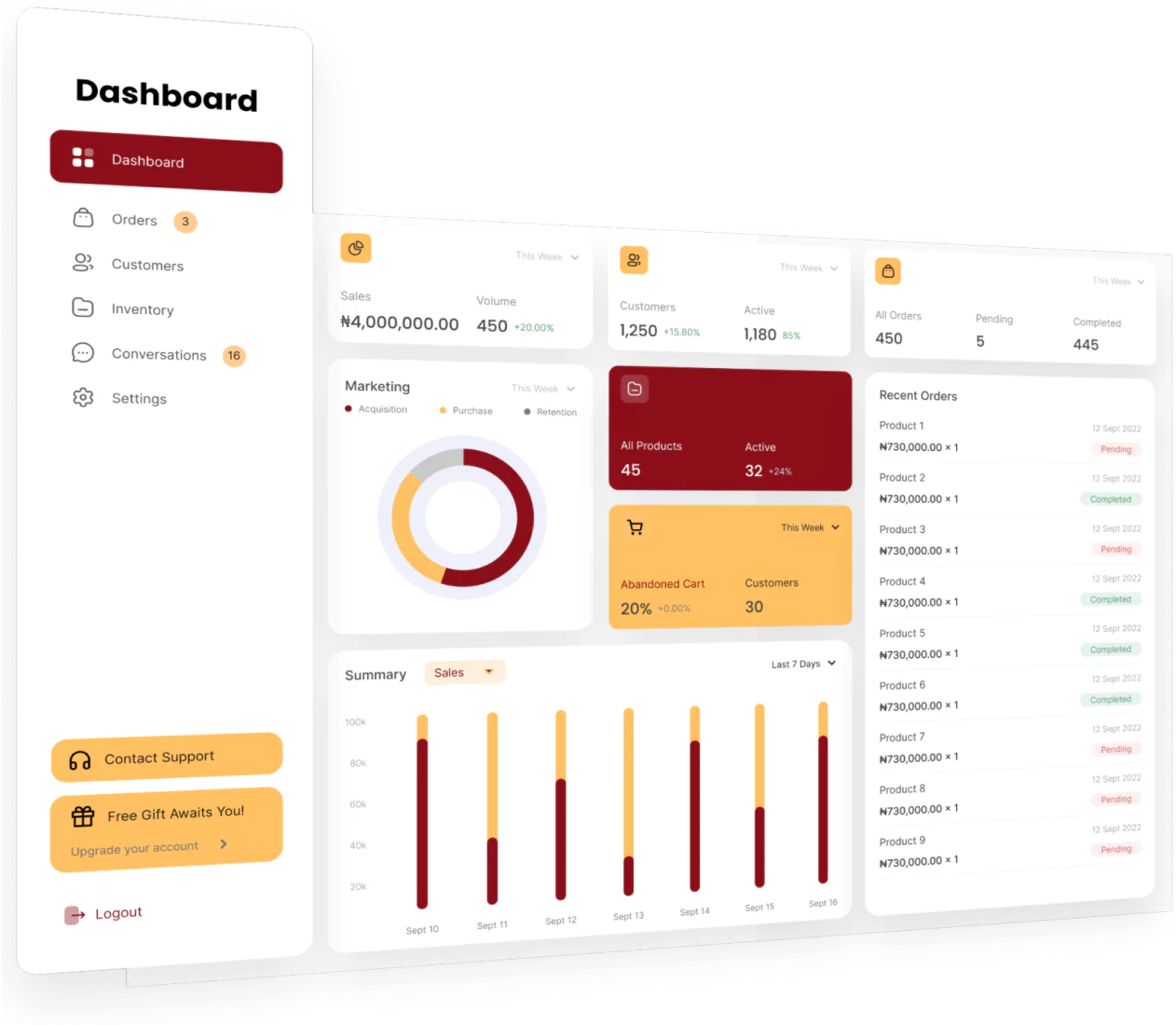Imagine your sales team spending hours chasing leads, only to find that most of them are not ready to convert. Frustrating, right? This is where lead qualification comes in – a strategic process to identify which leads are worth pursuing and which are not.
Powered by tools like CRM software, lead qualification helps businesses streamline their efforts, save valuable time, and close deals more efficiently. But how does it work, and why is it essential for sustainable growth?
In this article, we’ll explore the basics of lead qualification and show you how CRM software can turn your sales funnel into a revenue-generating machine. Manatili sa amin upang matutunan ang mga praktikal na kaalaman na makakatulong sa iyong koponan.
Table of Contents

Key Takeaways
|
What is Lead Qualification?
Lead qualification is the process of determining whether a potential customer also known as a lead is a good fit for your product or service. It involves evaluating their interest level, needs, and ability to make a purchase decision.
By filtering out leads that aren’t ready or suitable, businesses can focus their efforts on high-value prospects, improving efficiency and boosting sales success. This essential step in the sales process ensures that your team spends time on opportunities that truly matter, leading to better resource allocation and higher conversion rates.
The Difference between Qualified Leads and Unqualified Leads
Not every lead is a good match for your business. Some leads are ready to move forward, while others may need more time or might not be a fit for your product or service at all.
Knowing the difference between qualified and unqualified leads is essential to streamline your sales process and ensure your team prioritizes the right opportunities.Narito ang isang malinaw na talahanayan na naglalarawan ng mga pangunahing pagkakaiba:
| Aspect | Qualified Leads | Unqualified Leads |
|
Interest Level |
Actively interested in your product or service. |
Minimal or no interest shown. |
|
Budget |
Has the budget to make a purchase. |
Lacks the financial capability. |
|
Decision Making Power |
Has authority to make purchasing decisions. |
Does not have the authority or influence to make decisions. |
|
Timing |
Ready to take action within a reasonable timeframe. |
No urgency to take action or make a purchase. |
By identifying these key differences, you can refine your lead qualification process and direct your efforts where they will have the greatest impact.
The Difference between Lead Scoring and Lead Qualification
While lead scoring and lead qualification are both essential components of an effective sales process, they serve different purposes and are applied in different ways.
Understanding how they differ can help you use these strategies together to identify and prioritize the best opportunities for your team. Below is a table that outlines their distinctions:
| Aspect | Lead Scoring | Lead Qualification |
|
Definition |
A numerical system used to rank leads based on their behavior and fit. |
A process to determine whether a lead is ready and suitable for sales engagement. |
|
Focus |
Prioritizes leads based on a scoring system. |
Evaluates leads on criteria such as interest, budget, and authority. |
|
Method |
Relies on metrics like website activity, email engagement, and demographics. |
Involves more in-depth assessment, often including direct conversations. |
|
Automation |
Commonly automated using CRM software or marketing tools. |
May require manual input from the sales or marketing team. |
|
Outcome |
Helps rank leads to decide who to approach first. |
Determines if a lead should be pursued or nurtured further. |
The Importance of Lead Qualification for Your Business
Effective lead qualification plays a critical role in optimizing your sales and marketing efforts. Here are the key reasons why it’s essential for your business:
- Enhances resource efficiency: By identifying leads with the highest potential, your sales team can focus their time and energy on prospects that are most likely to convert, reducing wasted effort.
- Improves conversion rates: Qualified leads are more likely to engage with your sales process, resulting in higher conversion rates and a more predictable sales pipeline.
- Reduces Customer Acquisition Costs (CAC): Focusing on the right leads minimizes the resources spent on pursuing unqualified prospects, helping you lower your overall customer acquisition costs.
- Aligns sales and marketing teams: A well-defined lead qualification process creates clarity and alignment between sales and marketing teams, ensuring both work toward common goals.
- Provides better customer insights: The qualification process helps you understand your customers’ needs, preferences, and pain points, enabling you to tailor your approach and improve customer satisfaction.
- Supports sustainable growth: Nurturing only high-quality leads can strengthen the foundation for consistent and scalable business growth.
To take your lead management to the next level, consider using the best lead management software to streamline and automate your processes for even greater efficiency and results.
Qualify Leads With Lead Scoring
A common method for lead qualification is lead scoring, where each prospect is assigned a point value based on their behaviour and fit. This typically occurs early in the sales process, allowing your team to prioritize where to invest their time.
The idea is simple: By scoring leads, salespeople can easily focus on the most promising prospects, which supports revenue growth.
You can create a lead scoring system that fits your business needs, but before you can use it, you’ll need to gather the right data. Here are the key factors to consider when qualifying leads:
1. Buyer profile
A buyer profile is a detailed description of your ideal customer. It includes key characteristics such as demographics, industry, company size, job role, and purchasing behaviour. By understanding your buyer profile, you can better assess whether a lead aligns with your target audience.
This helps you focus on prospects more likely to benefit from your product or service, making it easier to prioritize leads and drive conversions.
2. Company info
Company information refers to key details about the businesses your leads represent, such as industry, company size, revenue, and location. This data helps you determine whether a lead’s company fits your product or service well.
For example, a company in your target industry or one with a certain revenue range may be more likely to benefit from what you offer. Considering this information, you can prioritize leads from companies most aligned with your ideal customer profile.
Simplify Lead Qualification Management Using HashMicro Software
Managing lead qualification efficiently is crucial for any sales driven business. Using HashMicro software, you can streamline and automate the qualification process, allowing your team to focus on high-potential prospects.
The integration of CRM benefits and utilizing the Leading CRM platforms enhances this process, ensuring that no lead is overlooked and that resources are optimized. Here are some key features of HashMicro Software that simplify lead qualification management:
- Sales pipeline management refers to moving leads through different stages based on their current status. You can also customize the pipeline to match your specific needs and preferences.
- Sales team management involves monitoring the progress of sales activities and evaluating each salesperson’s performance. It also allows you to assign appropriate tasks and receive notifications about your sales representatives’ achievements.
- Revenue forecasting allows you to predict the potential income from each lead with accuracy, helping you create a prioritized list of prospects to focus on.
- Email marketing management enables you to design, personalize, and send targeted emails to specific groups of subscribers, customers, or leads. You can also reply to emails directly within the system.
- Sales report generation allows you to create real-time reports that provide insights into sales activities, team performance, profits and losses, and other important metrics.
By leveraging HashMicro software’s features, you can significantly enhance lead qualification efficiency, ultimately increasing conversion rates and driving business growth.

Conclusion
Lead qualification is a crucial step in driving sales success. It allows businesses to filter through potential customers, ensuring that time and resources are spent on leads most likely to convert.
By utilizing methods like lead scoring and evaluating key factors such as buyer profiles and company information, you can prioritize the right prospects and optimize your sales efforts.
With the right system in place, the qualification process becomes seamless, making it easier for your team to focus on what truly matters.
HashMicro offers an all-in-one solution to simplify and automate the lead qualification process. With its powerful CRM features, you can streamline the tracking, scoring, and nurturing of leads, enhancing your team’s productivity and increasing conversion rates.
Whether you’re looking to boost sales efficiency or improve your overall sales strategy, HashMicro provides the tools you need to succeed. Take the first step towards transforming your sales process by requesting a free demo today and discover how HashMicro can support your business growth.

FAQ Lead Qualification
-
How do you qualify someone as a lead?
Your lead qualification criteria will be determined by your business and its goals. But for the most part, you can qualify leads by learning about a lead’s goals, pain points, buying authority, and budget.
-
What is the lead qualification level?
Lead qualification is the process of identifying how well a prospect fits your ideal customer profile (ICP). In other words, if they’re a good fit for what you have to offer. It involves reviewing how well a potential buyer’s characteristics like their budget, organization size, and pain points align with your ICP.
-
What is a qualified lead?
A qualified lead is a potential customer in the future, based on certain fixed criteria of your business requirements. Only willing leads are classified as qualified leads, meaning the information provided by the lead is given willingly and freely. So purchased leads and databases don’t qualify as qualified leads.




















